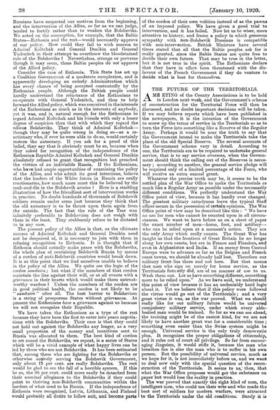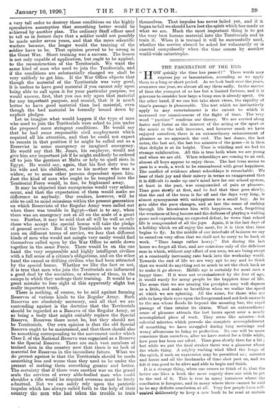THE FUTURE OF THE TERRITORIALS. A ME ETING of the County
Associations is to be held in London next week, and the Government's scheme of reconstruction for the Territorial Force will then be discussed, and no doubt important decisions will be taken. If we may believe reports which have been published in the newspapers, it is the intention of the Government to screw up the terms of service in the Territorials so as to turn the Force into something like a Reserve of the Regular Army. Perhaps it would be near the truth to say that the Government intend to make the Territorials take the place of the old Special Reserve. The several accounts of the Government scheme vary in detail. According to one, the Territorials are to be required to undertake general service, that is to say service overseas, when the Govern- ment should think the calling out of the Reserves is neces- sary; according to another, the general service pledge will be required only of a limited percentage of the Force, who will receive an extra annual grant.
Whatever the precise truth may be, it seems to be the settled plan of the War Office to make the Territorials as much like a Regular Army as possible under the necessarily different conditions. We perfectly understand the War Office point of view, because it has hardly ever changed. The greatest military cataclysms leave the typical Staff officer secure in the possession of certain opinions. The War Office point of view may be described like this : "We have no use for men who cannot be counted upon in all circum- stances. We want to have before us on a sheet of paper the exact number of men—horse, foot, and artillery— who can be relied upon at a moment's notice. They are the only Army which really counts. The Great War has taught us that the frontiers of Great Britain lie no longer along her own coasts, but are in France and Flanders, and even in Afghanistan and India. If an enemy from Central Europe were to advance as far as the Belgian and French coast towns, we should be already half lost. 'Therefore our military front lies there and not here. But that means that men who sign on merely for home service, as the Territorials formerly did, are of no manner of use to us. Wash them out. Let us have something different, something more to be relied upon." As we have said, we understand this point of view because it has an undeniably hard logic) about it. Yet we belie,ve that if this policy were followed the virtue would go out of the Territcirials ; and a very great virtue it was, as the war proved. What we should really like for our military future would be universe) compulsory military service, under which every able- bodied man would be trained So far as we can see ahead, the training might be of the easiest' kind, for we are not likely to have another great war for a considerable time ; something even easier than the Swiss ,system might be enough. Universal service is the only truly democratic plan. It recognizes the proper obligations of citizenship, and it rules out of court all privilege.. So far from encour- aging Jingoism, it would stifle it, because the man who breathes fin is also the man who is to suffer in his own person. But the possibility of 'universal service, much as we hope for it, is not immediately before us, and we- want to deal now only with the special question of the recon- struction of the Territorials. It seems to us, then, that what the War Office proposes would get the substance on paper but would lose the reality in practice.
The war proved that exactly the right kind of men, the intelligent men, who could use their wits and who made the best sort of soldiers for modern warfare, were attracted to the Territorials under the old conditions.. Surely it is a very tall order to destroy those conditions on the highly speculative assumption that something better would be achieved by another plan. The ordinary Staff officer used to tell us in former days that a soldier could not possibly be made under seven years, and that the more scientific warfare became, the longer would the training of the soldier have to be. That opinion proved to be wrong in the Great War. Short training was a success. The lesson is not only capable of application, but ought to be applied, to the reconstruction of the Territorials. We want the same kind of man who used to join the Territorials, and if the conditions are substantially changed we shall be very unlikely to get him. If the War Office objects that though the material of the Territorials was very good, it is useless to have good material if you cannot rely upon being able to call upon it for your particular purpose, we would answer, first, that you can rely upon that material for any important purpose, and, second, that it is much better to have good material than bad material, even though the bad material be formally bound down by explicit pledges. Let us imagine what would happen if the type of man who used to join the Territorials were asked to join under the proposed more stringent conditions. He would say that he had some responsible civil employment which required all his attention, and that he could not expect to remain in that position if he might be called out as a Reservist in some emergency or imagined emergency. He would say that Mr. Jones, his employer, would not give him any important job if he might suddenly be ordered off to join the garrison at Malta or help to quell Hots in Egypt. He would say, again, that his first duty was to his wife and his children, or to his mother . who was a widow, or to some other persons dependent upon him. Just the kind of man who ought to be tempted into the Territorial Force .would, in fine, be frightened away.
It may be objected that emergencies would very seldom occur, and that the expectation of them would make. no difference to anybody. Our readers, however, will be able to.call to mind occasions within the present generation on which Reservists of the Regular Army were called out when there was trouble in Egypt—that is to say, when there was um emergency not at all on the scale of a great war. Further, it may be said that all will be well as only those .who accept the .special bonus will take the pledge of general service. But if the Territorials are to contain men on different terms of service, we fear that different kinds of men who would not mingle very.easily would find themselves called upon by the War Office to settle down together in the same Force. There would be on the one hand the very responsible and highly intelligent civilian with a full sense of a citizen's obligations, and on the other hand the casual or drifting civilian who had been attracted by the special bonus. Whether we like the fact or not, it is true that men who join the Territorials are influenced a good deal by the amenities, or absence of them, in the camps in which they undergo their training. It would be a great mistake to lose sight of this apparently slight but really important truth.
There is nothing, of course, to be said against forming Reserves of various kinds to the Regular Army. Such Reserves are absolutely necessary, and all that we are contending against is the doctrine that the Territorials should be regarded as a Reserve of the Regular Army, or as being a body that might suitably replace the Special Reserve. . Reserves there must be, but they should not be Territorials. Our own opinion is that the old Special Reserve ought to be maintained, and that there should also be something corresponding to the movement under which Class I. of the National Reserve was organized as a Reserve to the Special Reserve. There are such vast numbers of trained men in the country now that there is no lack of material for Reserves in the immediate future. What we do protest .against is that the Territorials should be made something less and 'worse than they used to be under the pretext of making them something greater and better. The certainty that if there were another war on the grand scale the services of every able-bodied man who could shoulder a rifle would be required overseas must be freely admitted. But we can safely rely upon the patriotic impulse which has always called forth to the help of their .country. the men who had taken the trouble to train themselves. That impulse has never failed yet, and if it began to fail we should have lost the spirit which has made as what we are. Much the most important thing is to get the very best human material into the Territorials and to train it. When it is trained it will be successfully used, whether the service abroad be asked for voluntarily or is exacted compulsorily when the time comes by another world-wide catastrophe.



































 Previous page
Previous page